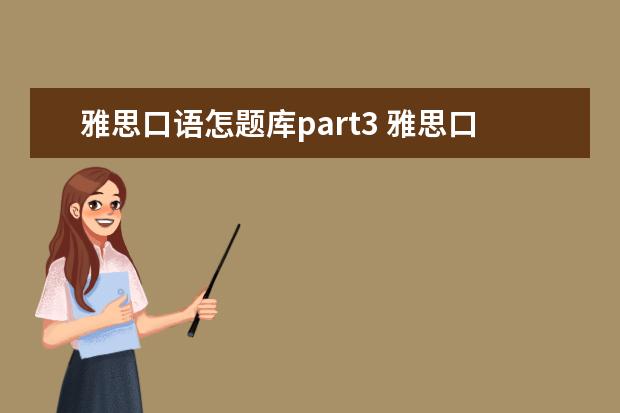雅思考试主要是通过对考生听、说、读、写四个方面英语能力的考核,综合测评考生的英语沟通运用能力,实现“沟通为本”的考试理念。对于雅思考生来说,也有很多考试难点和政策盲区需要帮助解答。今天雅思无忧网小编准备了雅思5-8月口语题库part3 如何应对雅思口语Part3的利弊分析?,希望通过文章来解决雅思考生这方面的疑难问题,敬请关注。

雅思口语part3做题技巧?我这部分总是分数比较低 - ...
洛阳大华雅思提醒您,
一)题目的性质从原来较为生活化的Part 1和Part 2转化为Part3中带有强烈学术意味的考题。比如How does scientific research benefitspace, medical, environmental and information technologies? 该题问科学研究给现代技术带来怎样的好处。
二) 很多考题不再注重具体的细节描述或陈述,而转向考察考生的抽象思维能力。比如Does money bring people more happiness or make them less secure? 该题问钱会给人带来幸福,还是使人更不安全。碰猜拿
三)有相当数量的题目会让考生去对某个话题进行评估(Asses*ent),特别是利弊方面的评估;还有些考题让你对未来进行猜兆局测(Speculation),让你说10年或20年之后某事物将会怎么样。比如In your opinion, what languages will become morepopular in the future? 该题要你猜测将来什么语言会变得流行起来。当然,你还必须说明理由。
总的来说,Part 3已经超越了日常生活层面,进入到人的深层思维体系之中。它着重的是四样东西:world views(世界观),beliefsystems(信仰体系),values(价值观),attitudes(态度)。要把这些东西说好,除了平时的语言功底和随机应变的能力以外,考生还需要具备一些人文方面的素养。
虽然Part 3的问题错综复杂,但根据笔者的教学及实战经验,我们完全可以把所有Part 3的考题分为以下的九个大类,每一大类都含有若干典型的问话套路:
一)阐述原因(Giving reasons)
Why do you think …?
Why is it important to do…
Do you think …? Why (not)?
Is it a good idea to (do…)? Why (not)?
二)预测未来(Providing speculations)
How do you see … changingin the future?
Do you think that in thefuture people will …?
What do you think willhappen to … in the future?
In your opinion,which/what … will become more … in the future?
三)描述侧面(Describing various aspects)
In what ways …?
What kind/sort/type of …?
How important is it for …to (do …)?
How has … changed (in yourcountry) in the last … years?
四)维护立场(Defending your choice)
Is it better to (do …) or(do …)?
笑搭Should people always … oris it a good idea sometimes to (do …)?
Which is more important toyou: … or …?
Which do people in yourcountry prefer: … or …?
五)利用常识(Using your common sense)
Any yes-no question thatinvolves a clearly positive or negative answer
Any question that asks youabout the roles, responsibilities and general qualities of a social group
Any question that asks youabout common knowledge, everyday experience and traditional culture
六)提供方案(Offering solutions)
What can … do to (do …)?
What can be done to (do…)?
What do you think is thebest way for … to (do …)?
Are there other wayspeople can …, apart from …? How?
七)因果关联(Connecting causes with effects)
What effect has … had on…?
How has … affected …?
Are there any negativeeffects of … doing …? What are they?
What do you think causes …to …?
八)对比异同(Comparing similarities and differences)
How does … compare with …?
How do you compare … with…?
Do you think … wasdifferent for your grandparents?
What are similarities anddifferences between … and …?
九)陈述利弊(Illustrating advantages and disadvantages)
What are the advantages anddisadvantages of …?
What are the differentadvantages of … and …?
What do you think theirdisadvantages are?
How do people in yourcountry feel about (a controversial issue)?
从《剑桥雅思》的口语出题风格来看,一般一套口语题的Part3部分会有6道问题,这一点大家可以参阅《剑一》到《剑七》的真题。下面的这套题从place到travel/touri*再到old buildings/historic buildings,提出了一系列问题:
Why do you think peoplelike to travel to different places?
→ 第一类:阐述原因(Giving reasons)
How do you see touri*changing in your country in the future?
→ 第二类:预测未来(Providing speculations)
Why is it important toprotect the countryside?
→ 第一类:阐述原因(Giving reasons)本文
In what ways is thecountryside in danger in your country?
→ 第三类:描述侧面(Describing various aspects)
Why are historic buildingsand monuments important to a city?
→ 第一类:阐述原因(Giving reasons)
Is it better to keep oldbuildings, or build new modern ones?
→ 第四类:维护立场(Defending your choice)
由此可见,任何Part 3的问题都可以归入以上九大类中的某一类。在本系列的后面九讲中,针对每一类问题的特殊性,为大家一一分析破解它们的方法,也希望广大“烤鸭”们能切实利用这些方法来为自己的考场发挥添砖加瓦。
总的来说,雅思口语考试Part 3作为考试中第三部分,也是最困难的一个部分,所以把握好总结的雅思口语考试Part 3答题技巧也就非常重要.
雅思口语part3一般问几个问题
雅思口语part3一般问3-4个问题。
1、PART 1 ( 4-5 分钟):
雅思口语考官将问你一些非常直接的问题。第缺租猛一部分是整个口试中最简单的部分。考官就 一个话题将会问你 3 到 4 个问题。然后转到另一个话题。你将谈论你自己、你的专业、你的学习(过去或现在)、你的家庭、你的家乡、你的爱 好,或你的日常活动。要扩展你的回答,给出详细伏桥的信息,使其具有趣味性,这型锋样一切就会很好。问题不会很 难。只需要简单地围绕着问题回答,并向考官展示你能够交谈。别把事情复杂化。只要充分地回答每个问题即可。
2、PART 2 (1 分钟准备+2 分钟回答)
雅思口语考官将会给你一张卡片,上面写着一个主要问题和一些谈论的思路。你将有 1 分钟的时间去思考要说些什么。你可以做一些注记际应该做!!!)。没有做任何注记的考生在说了 1 分 30 秒之后往往说不下去了,频繁地重复,或犹豫很久。1分钟准备时间到,考官将请你 开始谈话。
3、PART 3 (4-5 分钟)
雅思口语考官将会询问与第二部分话题相关的问题。第三部分的问题将会更加“抽象化和概念化” (即问题的难度将会加大)。
如何应对雅思口语Part3的利弊分析?
雅思口语第三部分往往是对于第二部分的一个拓展衍生,这部分的问题比较的深入,有时候是需要考生有一个批判性的思考方式。所以环球青藤老师就来谈谈如何应对雅思口语Part3的利弊分析。出题方式:判宏巧What are the advantages and disadvantages of ….?解题思路:利弊分析,即要求考生讨论advantages & disadvantages,建议考生从不同角度不同方面去考虑这个问题。比如从个人和社会角度,从科教文卫体五大角度等等。总之,在回答的时候,可以适当地对于分析对象进行分类,然后阐述观点。考生的回答思路大致如下:首先先明确地指出优缺点,建议用一句话概述即可。然后给出具体的理由或者例子进行解释说明。随后进行总结,究竟是利大于弊还是弊大于利或者视情况而定。常用表达:One of the main advantages of….A key advantages of….A really good thing about….Another advantage of….Another good thing about…范例:What are the advantages and disadvantages of working outdoors?I think it really depends on what kind of job you have outdoors. In general, most outdoor jobs are quite physical, so I think that they can help people keep fit and healthy as well as being outside in the open air. On the other hand, it can be awful to work outside because you may have to work in terrible weather, like rain, snow and extreme cold.分析:这道题目掘键是问户外工作的优缺点。考生的回答很客观,这要视工作性质而定。大多数的情况下,户外工作是需要体力劳动的,这有助于人们计划持健康,但是有时候在恶劣环境下工作是非绝陪常可怕的,比如暴雨暴雪或者是很冷的天气。考生将优缺点描述的很清楚,结构与思路也十分清晰,是值得学习的。练习:接下来的几道题目,学生可以自己利用上述方法进行练习,体会其中的解题技巧和步骤。What are the advantages and disadvantages of keeping pets?What are the advantages and disadvantages of public transportation?What are the advantages and disadvantages of having a big family?
【雅思口语】春季难题总结: Part 3
由于其问题的深度和广度,雅思口语考试中的Part 3历来是其中最难的一部分,同时也成为决定考生是否能拿到口语高分的一个关键。纵观2021年春季的十来场雅思考试,口语的Part 3部分仍有不少题目成为考生冲刺高分的障碍。Part 3的扩展性讨论向来和Part 2的卡片题紧密相连。所以,如果Part 2的常见话题可以大致归顷哪为四大类的话,将Part 3的考题也按话题划分成闭御四大类-Person, Place, Object and Event,分别总结出其中较难的考察点以及可以供考生参考的备考方法。,
Ⅰ Person(人物类之相处篇)
,人物类的考题当中描述身边人物的考题很多,最常见的应属朋友、家人、邻居、老师及青少年等等。人与人之间有互动性和依赖性,“相处之道”便成为这一类话题中考官经常问到的问题。考生在回答这类问题时虽然可以见仁见智,但往往觉得把握不了相应的“准则”。一般来说,考察点分以下几种:,
1. 与人相处的重要性
,What is the importance of having a neighbor? (neighbor),Do you think it is important to get along well with your neighbors? (neighbor),
2. 与人相处的方法或困难
,How should parents deal with their teenagers? (Son or Daughter) (teenagers),Why is it that teenagers do not listen to their parents? (teenagers),
3. 与不同人相处的对比讨论
,What is the difference beeen your relationship with your teacher and your parents? (teacher &轿乎岩 parents),What is the difference beeen neighbors and friends? (neighbors & friends),事实上,考官不会去判断考生与人相处的准则是对还是错,而更多的是关注考生所给出的理由是否能支持自己的观点。提醒考生,这样的题目内容回答一定要以自己的亲身经历,又或者是通过各种渠道了解的相关的真人真事为基础,才能真情流露,最具说服力。,
Ⅱ Place(地点类之理想篇)
,不管是人们自己的住所还是公园、学校、电影院、博物馆、历史建筑等公共建筑设施,人们总会对这些地方存有各自的理想,而这些也往往成为考官们在这一类话题中询问考生的一个重点。但很多考生在备考时往往对自己的想象空间过于自信,认为考场上即使问到,随便也能答上一两句,而恰恰就是这样的疏忽造成考试时无法在有限的时间内将自己的想象发挥出来。除了会描述自己理想中的场所以外,对许多公共设施来讲考生还会被要求表述 *** 可以帮助改善的方面。,
1. 个人的理想
,Do you think it is important to have a garden in your house? (house),What kind of park should we have in a city? Why? (park),Do you think museums should be free? (museum),
2. 对 *** 的期望
,Do you think the government should allocate more money in improving the park in your country? (park),Should the government control the qualities of the buildings? (building),Do you think your government should provide free cinemas for the people in your country? (cinema),l Are there any problems in the existing educational systems? How can the government solve the problem? (school),提醒考生,在备考的时候就应当对这样的题目加以重视,充分发挥自己的想象,大致勾勒出自己理想中的各种场所并说明原因。而且说明原因在其中占有更重要的位置。由此,在完成公共设施理想的过程中, *** 还可以做出哪些相应的努力,也可以顺理成章准备下来。准备的内容越多,考场上可供筛选和使用的东西就越多。,
Ⅲ Object(物品类之功用篇)
,电脑、照片、杂志、游戏、交通、动物(暂且把其大致归到物品类)……物品类的考题可谓花样繁多。但凡作为物品来讲,人们使用或保留它们都是因为它们有一定的功用,所以考察物品功用的问题在这类题目中屡见不鲜。凡事都应一分为二去看,影响一定有好有坏,所以考生在备考时,如果两方面没有都顾及到的话,考试时便较难应对了。,What roles do photos play in people’s life? (photo),What can we learn from playing games with other people? (game),Why do people raise pets? (animal),What do you learn from watching movies? (movie),
2. 负面影响
,What are the disadvantages of playing too many games? (game),What are the negative effects of having too many cars in a country? (transportation),Why do some people think that having a pet is very inconvenient? (animal),What are the disadvantages of puters? (puter),这样的一些问题让我们不禁联想到写作中的利弊型作文。事实上,这类题目是可以和写作的部分题目一起准备的,而且作为口语第三部分的考题,回答所用的词汇和句型表达等都可以参考写作的内容。所以,建议考生,充分利用各科考试中相关联的内容可以节省备考时间。,
Ⅳ Event(事件类之意义篇)
,旅行、聚会、结婚、休闲娱乐、体育赛事,对于发生在我们周遭的事情,考生有没有对它们进行过深入的思考很大程度上取决于有没有去总结过这些事件发生之后所产生的影响和意义。而这些也是考官常考的方面。如何用具体的事例去展示自己对于事件意义的看法是考生较难做到的。,What is your opinion on formal parties? (party),What is the importance of having a wedding in your country? (wedding),What do you think is the importance of playing sports? (sports event),What are the things you can learn / do people learn from traveling? (trip),从上面的题目中可以看出,考官询问的是考生对某一事件意义的笼统观点。提醒考生,在阐述事件意义的时候一定要结合具体的例子加以说明,否则论证中缺乏论据,会显得很空洞。,所以,要有效地控制时间,在最短的时间内去思索和准确表达出自己的ideas,考生一定需要在考试之前尽可能地做好准备。借此希望考生们平时能够细心观察周围的事物,多想多思考,做一个“有想法”的人。
雅思口语Part 3的答题技巧演示。
今天,环球青藤朱滚睁国伟老师和大家分享一篇关于雅思口语Part 3的答题技大毕岁巧演示文章,值得大家阅读学习。更多精彩好文章,尽在环球青藤!雅思口语Part 3问题1:What are some reasons why people eat out ?雅思口语数唤Part 3的答题技巧演示1:It’s a tradition that we intend to treat our friends and family on some special occasions , especially on birthday , and some important days . a fancy restaurant can provide us decent dining environment , delicious cuisines and thoughtful service . by the way , these days , office workers are getting busier , they have no time to prepare home cooked food , eating outside is the only remaining option .雅思口语Part 3问题2:Do you prefer to eat at a restaurant or eat at home ?雅思口语Part 3的答题技巧演示2:I prefer to eat at home . my mother is good at cooking , she usually prepares a table of delicious dishes at home . by the way , my country has a notorious reputation of food security . so eating at home is much safer.雅思口语Part 3问题3 What are the differences between eating at home and eating at restaurants ?雅思口语Part 3的答题技巧演示3: Eating at restaurants , you may enjoying a decent dining environment , cuisines with different taste and flavor , and thoughtful service . compared to eating at restaurant , dishes prepared at home are simple but balanced and nutritious .雅思口语Part 3问题4In my opinion what is healthy food ?雅思口语Part 3的答题技巧演示4: A healthy meal should be balanced and nutritious . in each meal , we need to intake various vegetables , different kinds of fruits and many types of proteins . by such way , we may maintain a good physical health .雅思口语Part 3问题5What are some examples of unhealthy food ?雅思口语Part 3的答题技巧演示5:In my opinion , there are many types of unhealthy food , like western style fast food , desserts with high calories , and food sold at street vendors . food like French fries , hamburgers are very harmful to our health .以上即是本次环球青藤口语老师朱国伟的关于雅思口语Part 3的答题技巧演示文章分享。逻辑能力强,精通口语词汇。对于欧美的文化很了解。多年的教学经验帮助了不少雅思考生顺利进入理想学府,桃李满园。相信他的这篇文章必定能给与烤鸭们不少帮助和启发。如果对于我们雅思课程想了解更多的话,欢迎与环球青藤课程顾问做进一步的咨询与了解,这里有不同的单项课程以及全项课程,适合不同要求的你!后,环球托福预祝各位雅思考试取得!早日圆满出国留学梦!
以上就是雅思无忧网为您准备的雅思5-8月口语题库part3 如何应对雅思口语Part3的利弊分析?全部内容。访问雅思无忧网(https://www.yasi.cn/),了解更多雅思考试新消息,新动态。
雅思培训
免责声明:文章内容来自网络,如有侵权请及时联系删除。


 雅思口语真题回忆part3 如何应对雅思口语Part3的利弊分析?
雅思口语真题回忆part3 如何应对雅思口语Part3的利弊分析?
 雅思口语真题答案part3 雅思口语Part3怎样应答
雅思口语真题答案part3 雅思口语Part3怎样应答
 雅思口语part3技巧 雅思口语Part3怎样应答
雅思口语part3技巧 雅思口语Part3怎样应答
 雅思口语part3备考技巧 雅思口语考试Part3一般会要求说多长时间
雅思口语part3备考技巧 雅思口语考试Part3一般会要求说多长时间
 雅思口语考试part3解答技巧 雅思口语考试Part3备考技巧有哪些?
雅思口语考试part3解答技巧 雅思口语考试Part3备考技巧有哪些?
 雅思口语part3回答技巧 如何应对雅思口语Part3的利弊分析?
雅思口语part3回答技巧 如何应对雅思口语Part3的利弊分析?
 雅思口语part3 题库 如何应对雅思口语Part3的利弊分析?
雅思口语part3 题库 如何应对雅思口语Part3的利弊分析?
 雅思口语part3题库中文 如何应对雅思口语Part3的利弊分析?
雅思口语part3题库中文 如何应对雅思口语Part3的利弊分析?
 雅思口语怎题库part3 雅思口语怎样做好 Part3的问题分析和解题思路 - 百...
雅思口语怎题库part3 雅思口语怎样做好 Part3的问题分析和解题思路 - 百...
 雅思口语part3问了题库外 ...考官和我一直在交谈,并且说了很多,结果Part3最后...
雅思口语part3问了题库外 ...考官和我一直在交谈,并且说了很多,结果Part3最后...